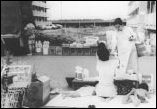|
|
 |
Production Company: Seirinsha Producer: Yoneda Masaatsu Director: Wakatsuki Osamu Assistant Director: Eda Tamio Photography: Shimizu Yoshio Camera Assistant: Sasaki Masahiko Sound: Kubota Yukio Music: Yokota Toshiaki Narrator: Kishino Kazuhiko Negative Editor: Ichihara Keiko Titles: Maruki Toshi Production Adviser: Takagi Ryutaro Directorial Adviser: Tsuchimoto Noriaki. 1982 / Color / 16mm / 54 min |
| In Matsuyama City, a housewife makes soap out of used cooking oil in her kitchen. This does not mean that she knows why adding sodium hydroxide to the oil turns it into soap but, unlike synthetic detergent, this soap does not contaminate the water. Meanwhile, in Lake Biwa, Japan's largest lake (Lake Biwa supplies water to the entire Kansai area, from Kyoto to Osaka), once so clean that sweetfish made it their home, tiny shellfish called corbiculae were on the verge of extinction and red tides were a common occurrence. The cause, it was found, was waste water from local households containing synthetic detergent. A local group began a movement to collect used cooking oil from 60,000 households to make soap. Before the group knew it, their campaign against synthetic detergent had expanded across the country. This documentary elucidates the perceptions that urban residents have towards their tap water, focusing on the steadfast housewives as they try to broaden the movement to stop the use of synthetic detergent and sell harmless handmade soap nationwide. Wakatsuki made this film, his first, as a student with Yamamura Nobuki and others under Tsuchimoto Noriaki in a course on aesthetic techniques in film begun in 1976 at Athénée Français Cultural Center. |